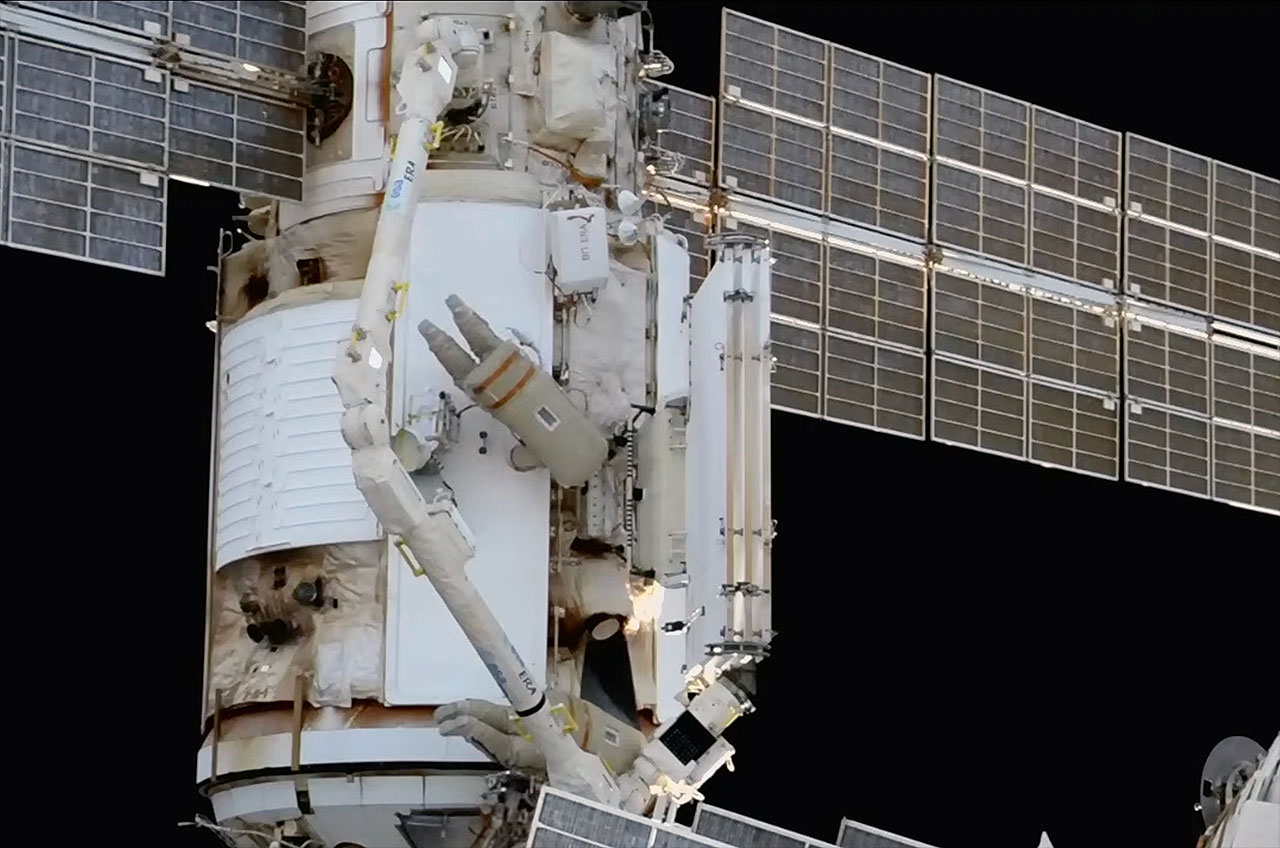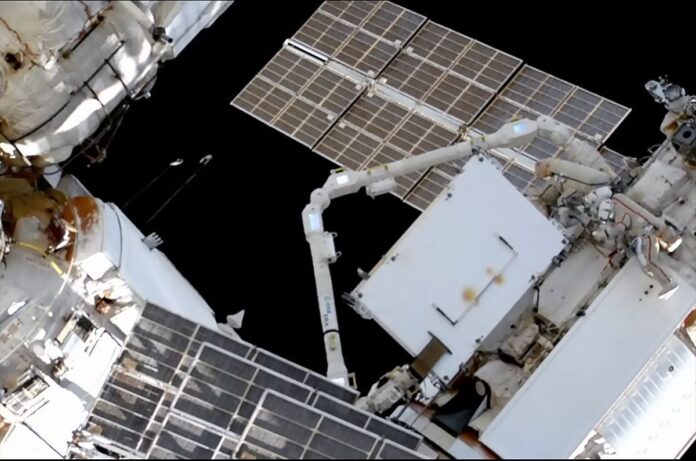Two Russian cosmonauts helped relocate a large radiator outside of the space station overnight, completing a spacewalk that had been twice delayed.
International Space Station Expedition 69 commander Sergey Prokopyev and flight engineer Dmitry Petelin, both of Russia’s federal space corporation Roscosmos, conducted a 7 hour, 55 minute EVA (extravehicular activity) overnight on Tuesday and Wednesday (April 18 to April 19) to relocate the radiator from one Russian module to another.
The hardware, part of the space station’s cooling system, was launched 13 years ago by NASA’s space shuttle Atlantis. It was repositioned now to support a newer module on the Russian segment of the space station.
Prokopyev and Petelin exited the station’s space-facing Poisk module on Tuesday at 9:40 p.m. EDT (0140 GMT on April 19), repeating many of the same preparatory steps as they did on two earlier attempts to achieve the same set of tasks. On their first try on Nov. 25, 2022, an issue with a pump on Prokopyev’s Orlan spacesuit forced Russian flight controllers to call off the spacewalk before the two cosmonauts had even entered the airlock.
Then, on Dec. 14, Prokopyev and Petelin were waiting for the airlock to fully depressurize when what is believed to be a micrometeorite impacted Russia’s Soyuz MS-22 spacecraft, venting its coolant reserves into space. Although the cosmonauts were never in danger, again the EVA was postponed.
Fortunately, no problems arose this time to prevent Prokopyev and Petelin to set about completing the spacewalk, continuing work from a previous excursion on Nov. 17, 2022.
To that end, after exiting the Poisk module, the two cosmonauts proceeded to make their way to the Rassvet mini-research module, where the radiator has been mounted since its launch on NASA’s STS-132 mission in May 2010. There, Prokopyev and Petelin released cables, removed protective covers and manually freed locks holding the radiator to the module.
Related: Russian cosmonauts complete station spacewalk to ready radiator for move
It was then up to the European Robotic Arm, a relatively new addition to the Russian segment of the space station, to move the 1,256 lbs (570 kg) radiator from Rassvet to the Nauka multipurpose laboratory module. Expedition 69 flight engineer Andrey Fedyaev operated the robotic arm from inside the space station.
“I feel as if I were on a construction site and something very large and heavy is being lifted,” said one of the spacewalkers as he watched the radiator slowly move overhead. “There is a big difference, though, between here and a construction site on the ground. I can stand under a very heavy piece of equipment and it will not fall on my head.”
While waiting for the radiator’s transfer, Prokopyev and Petelin attached an adapter for the robotic arm to an extendable boom that will be used during their next spacewalk together to move an experiment airlock from Rassvet to Nauka. The cosmonauts then made their way to the Nauka module to oversee the radiator’s installation.
“And that’s it,” said one of the spacewalkers as the radiator came into contact with its new attach point on Nauka. Prokopyev and Petelin then set about securing cables and connectors to the radiator, tying the hardware into the module’s coolant and power supply.

With all the tasks they set out to achieve complete, Prokopyev and Petelin packed up their tools and made their way back to the Poisk module. Closing the hatch to begin re-pressurizing the airlock, the spacewalk came to an end at 5:35 a.m. EDT (0935 GMT) on Wednesday.
The EVA was the fourth for Prokopyev, who has now logged 29 hours and 51 minutes outside of the International Space Station. It was the second spacewalk for Petelin, who has spent 14 hours and 20 minutes on EVA. The two are scheduled to conduct two more spacewalks on Tuesday, April 25 and Thursday, May 4.
The spacewalk was the third for the year and the 260th since 1998 in support of assembly and maintenance of the ISS.
Follow collectSPACE.com (opens in new tab) on Facebook (opens in new tab) and on Twitter at @collectSPACE (opens in new tab). Copyright 2023 collectSPACE.com. All rights reserved.

